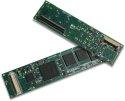Second-generation wireless sensor platform runs Linux
June 8, 2007 Crossbow Technology will demonstrate its tiny XScale-based platform for wireless sensing, at the Sensors Expo tradeshow next week. The Imote2 is supported by a 2.6.14 Linux port from Intel's Mote 2 project, and will soon gain support for .NET Micro Framework, Microsoft's new low-end embedded platform. (more…)
Crossbow Technology will demonstrate its tiny XScale-based platform for wireless sensing, at the Sensors Expo tradeshow next week. The Imote2 is supported by a 2.6.14 Linux port from Intel's Mote 2 project, and will soon gain support for .NET Micro Framework, Microsoft's new low-end embedded platform. (more…)
 PrismTech has ported its software-defined radio (SDR) middleware to a tiny ARM-based single-board computer (SBC), in order to demonstrate the stack's low SWaP (size, weight, and power) requirements.
PrismTech has ported its software-defined radio (SDR) middleware to a tiny ARM-based single-board computer (SBC), in order to demonstrate the stack's low SWaP (size, weight, and power) requirements.  A pioneer in the mobile Internet tablet market is offering support to other devicemakers developing Mobile Internet Devices (MIDs) based on Linux. PepperPad producer Pepper Computing says it plans to ship its Pepper Linux implementation this fall to multiple adopters of Intel's MID hardware platforms.
A pioneer in the mobile Internet tablet market is offering support to other devicemakers developing Mobile Internet Devices (MIDs) based on Linux. PepperPad producer Pepper Computing says it plans to ship its Pepper Linux implementation this fall to multiple adopters of Intel's MID hardware platforms.  Data Evolution, which recently acquired AMD's low-cost Personal Internet Communicator (PIC), is offering the device at the discounted price of $99 without an OS. The “DecTop” is based on an AMD Geode GX processor, includes a 10GB hard drive, and supports both Linux and Windows CE.
Data Evolution, which recently acquired AMD's low-cost Personal Internet Communicator (PIC), is offering the device at the discounted price of $99 without an OS. The “DecTop” is based on an AMD Geode GX processor, includes a 10GB hard drive, and supports both Linux and Windows CE.  Embedded board-maker VersaLogic has started shipping free Linux BSPs (board support packages) for two more of its single-board computers (SBCs). Based on Debian Linux, the BSPs are expected to streamline hardware setup for customers of the company's Gecko and Puma boards.
Embedded board-maker VersaLogic has started shipping free Linux BSPs (board support packages) for two more of its single-board computers (SBCs). Based on Debian Linux, the BSPs are expected to streamline hardware setup for customers of the company's Gecko and Puma boards.  Following two months of planning, Canonical Ltd. has updated the Ubuntu Mobile and Embedded (UME) project's architecture roadmap. UME aims to create a version of the popular Ubuntu desktop Linux OS tailored to the requirements of Intel-based “mobile Internet devices” (MIDs), expected in 2008.
Following two months of planning, Canonical Ltd. has updated the Ubuntu Mobile and Embedded (UME) project's architecture roadmap. UME aims to create a version of the popular Ubuntu desktop Linux OS tailored to the requirements of Intel-based “mobile Internet devices” (MIDs), expected in 2008.  Apple's Apple-TV (A-TV) is based on a more-or-less standard Intel PC architecture, according to an in-depth “under-the-hood” analysis. Additionally, a community project has already reported success in getting a Linux kernel and various device drivers to operate on the platform.
Apple's Apple-TV (A-TV) is based on a more-or-less standard Intel PC architecture, according to an in-depth “under-the-hood” analysis. Additionally, a community project has already reported success in getting a Linux kernel and various device drivers to operate on the platform.  Via CEO Wenchi Chen revealed a business card-sized motherboard billed as the “world's first industry-standard form-factor for PC/phone convergence,” at Computex today. The “mobile-ITX” board measures 3 x 1.8 inches — half the size of Via's “pico-ITX” form-factor — and runs Linux or Windows XP Embedded.
Via CEO Wenchi Chen revealed a business card-sized motherboard billed as the “world's first industry-standard form-factor for PC/phone convergence,” at Computex today. The “mobile-ITX” board measures 3 x 1.8 inches — half the size of Via's “pico-ITX” form-factor — and runs Linux or Windows XP Embedded.  Yet another inexpensive miniature flash-based laptop running Linux has appeared. Chairman Jonney Shih introduced Asus's $190 Eee PC (3ePC) at a Computex keynote this morning, giving the audience a tour of its Windows-like Linux operating system, which boots in 15 seconds from 2GB of flash.
Yet another inexpensive miniature flash-based laptop running Linux has appeared. Chairman Jonney Shih introduced Asus's $190 Eee PC (3ePC) at a Computex keynote this morning, giving the audience a tour of its Windows-like Linux operating system, which boots in 15 seconds from 2GB of flash.